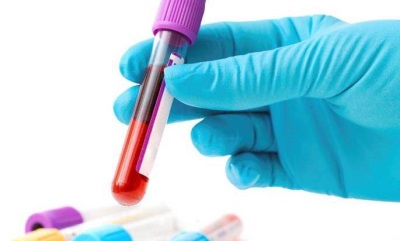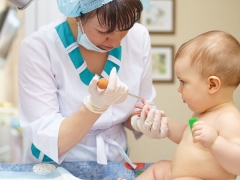Blood tests in children
With research, during which they analyze a person’s blood, everyone collides. Such tests are prescribed from birth, so each parent should know why they are needed and for what purpose.
Why take blood?
The study is appointed in cases where:
- There was a suspicion of the development of the disease in a child;
- It is necessary to assess how severe the child’s condition is and at what stage the disease is;
- The illness is unusually long or complications have appeared;
- It is necessary to determine whether the treatment helps;
- Prescribed prophylactic annual examination;
- Check the condition of the child who has a chronic disease.

Types and indications for surrender
Blood from a child can be taken from a finger (capillary) and from a vein (venous).
Also, all blood tests are divided into types depending on the purpose of their conduct:
- General blood analysis. This examination helps in the diagnosis of many diseases. It is also prescribed for prophylactic purposes, tracking whether the child is healthy. The main indicators of this analysis are the number of red blood cells, hemoglobin content, platelet count, the number and ratio of different forms of leukocytes, ESR. The study will help in the diagnosis of anemia, leukemia, infections, inflammatory diseases, dehydration and many other health problems.
- Biochemical. For this study, venous blood is used, which must be taken on an empty stomach. The analysis helps to determine the level of proteins, the amount of bilirubin, enzymes, fats, glucose and other indicators. Its results are important in identifying lesions of the liver, kidneys, and other organs.
- Serological. This analysis is aimed at identifying antigens or antibodies, so it is prescribed for viral infections and parasitic diseases, for example, to identify toxoplasmosis, amebiasis, herpes, HIV and other diseases. Also, serological diagnosis helps diagnose autoimmune diseases.
- Coagulogram. This test is needed to determine the state of the blood coagulation system. Based on this study, hemophilia can be diagnosed. The analysis is also necessarily prescribed when planning the operation.
- Allergy blood test. The study aims to identify specific antibodies that are formed in the blood during allergic reactions. Such an analysis is more extensive than skin tests, since it can be performed for a large number of allergens.
- Blood test for sugar. Determination of sugar is carried out as part of a biochemical analysis (from venous blood), and separately (when it is taken from the finger). Hand over this analysis should be strictly on an empty stomach. It is prescribed for children with suspected diabetes.
- The analysis to determine the blood group. Such an examination may be prescribed during preparation for the operation or, if necessary, an emergency blood can be transferred to the child. Also, this analysis is indicated for hemolytic disease of the newborn.
- Blood test for genetic diseases. This study is prescribed in the hospital, with the consent of the parents. Analyze the blood obtained from the heel. The examination helps to identify phenylketonuria and congenital hypothyroidism.
Where can I take the analysis?
Blood tests are carried out in clinics, and in hospitals, and in private laboratories or large medical centers.
In the usual clinic, the time for testing is strictly defined (blood is taken in the morning), and in other medical institutions it is possible to take it at any time of the day.
How to psychologically prepare a child?
Almost all children are very afraid of injections, therefore, going with a crumb for analysis, you need to pay attention to the psychological preparation of the baby. Try to explain to the toddler why the analysis is needed and how everything will happen. In this case, do not be fooled by the child, assuring that he will not be hurt at all. It is better to honestly say that the pain will be short and quickly pass. You can also play at home in the doctor, “treat” soft toys. You can still promise the baby to buy after an unpleasant procedure that will please the child.











